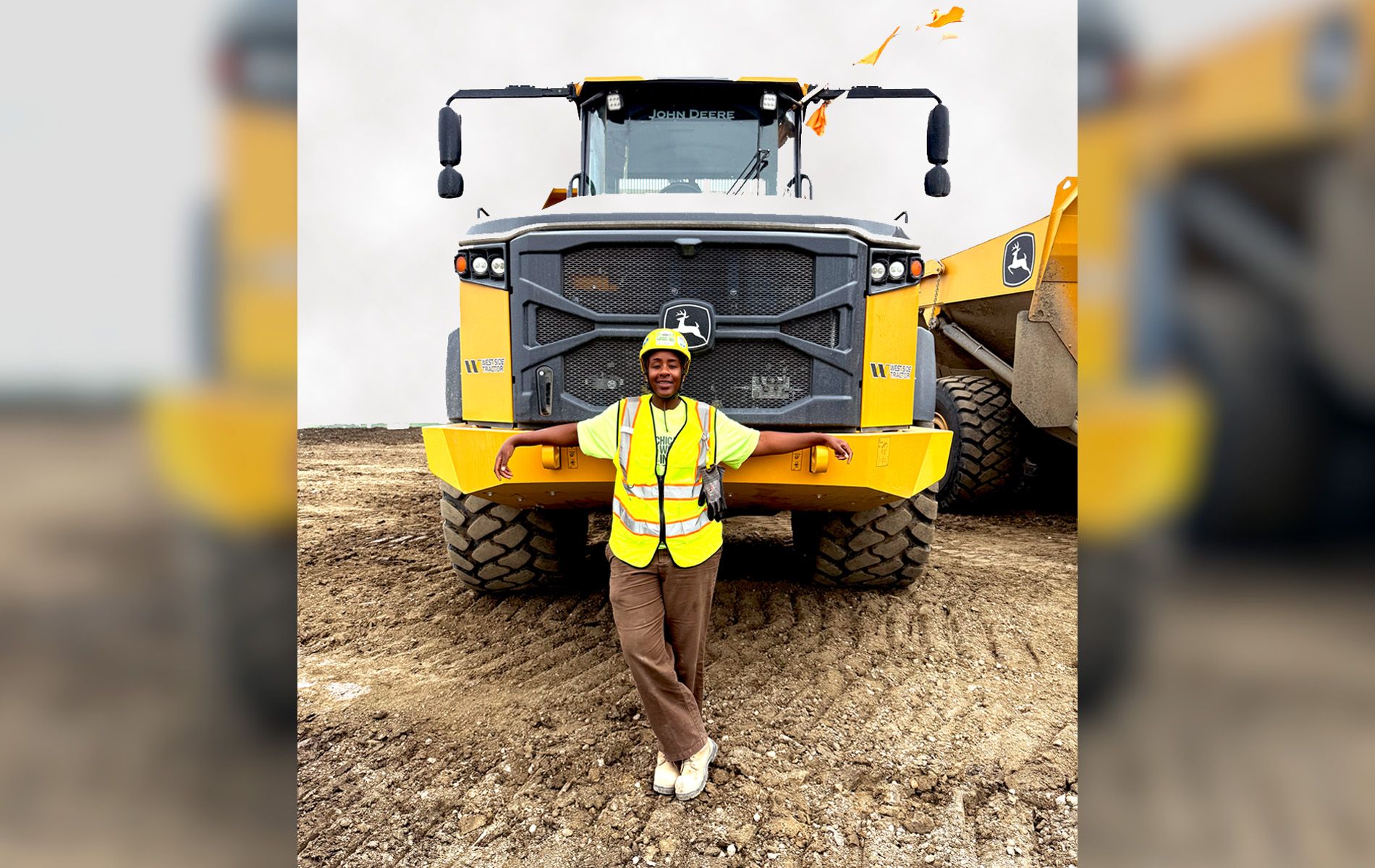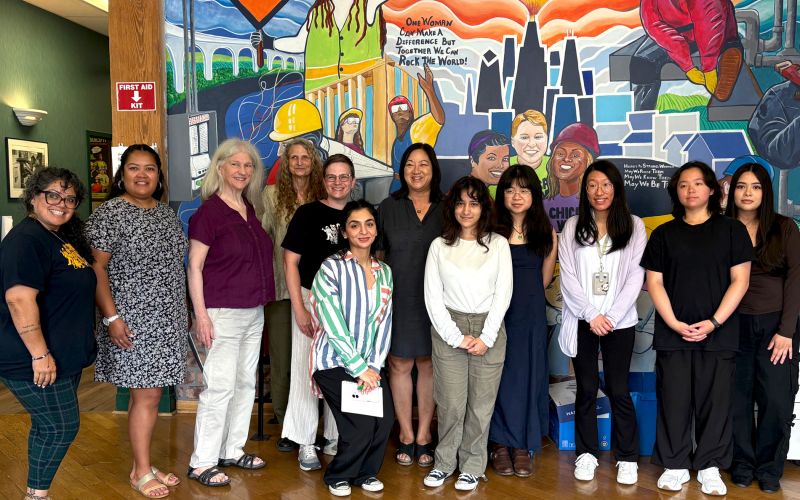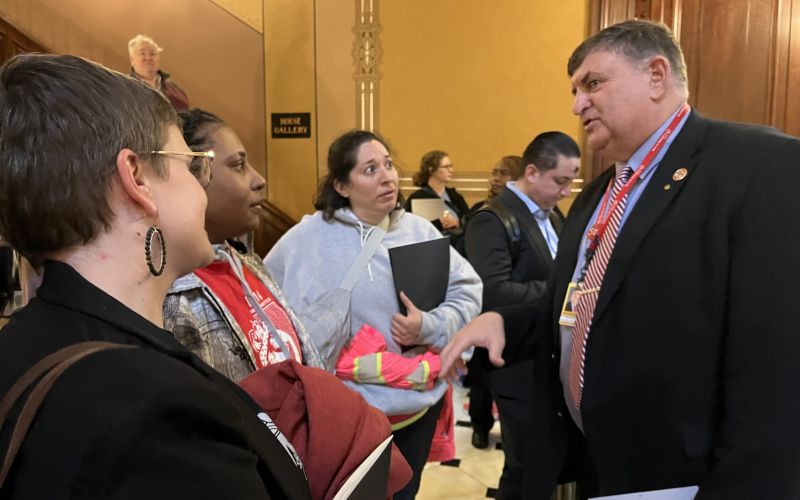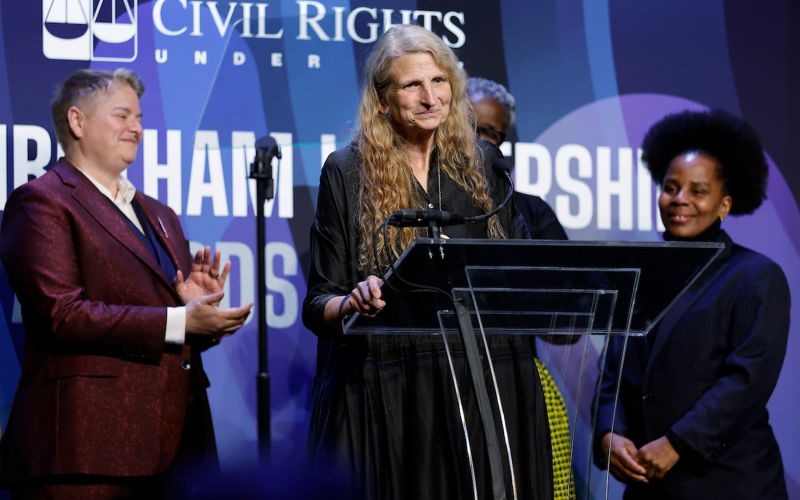July 18, 2025
From Military Service to Heavy Machinery: Operating Engineer Finds Her Calling in the Trades

Army veteran Romeisha (Ro) Willis trades corporate accounting for construction equipment — and couldn’t be happier
Romeisha (Ro) Willis operates heavy equipment at one of the world’s busiest airports, but her path to Local Union 150 began with a simple Google search. The Army veteran and business college graduate discovered her passion for operating engineering through Chicago Women in Trades, and hasn’t looked back since.
Q: What does an operating engineer do?
“An operating engineer means I operate heavy equipment. We get to build stuff, but we utilize equipment and vehicles to do it. It’s kind of fulfilling to be able to use a vehicle to move massive things.”
Q: How did your military background prepare you for this career?
“When I was actively in the service, I did some crane operating. I worked at a CRSP (Central Receiving and Shipping Point) yard and performed forklift operations while stationed in Kuwait. When I returned to civilian life, I said, ‘Hey, this is what I want to do for a living. I love what I do in the service, and I’ve been doing this for 10 years.’ When I came to CWIT and learned about each trade, I just gravitated towards becoming an operating engineer.”
Q: What was it like being a woman operating heavy machinery in the Army?
“I did get some pushback from some men at times, especially when I had to teach them. If they were coming on board new, and it was my CRSP yard that I was running with another soldier for seven months, they had to listen to me. But some guys would say, ‘Oh, I don’t want to listen to her. I know what I’m doing.’ And I had to say, ‘No, you don’t. I’ve been running this operation for seven months. Chill out for a second.’ But once they saw that I ran the yard with precision, and I was very professional and disciplined in what I was doing, they would get on board and listen to me.”
Q: How did you discover Chicago Women in Trades (CWIT)?
“I knew I wanted to get into the construction world. I didn’t know what I wanted to do — I didn’t know if I wanted to be an ironworker or a bricklayer. I had no idea. I got my degree in business, so I worked in business management and accounting. But it just wasn’t working for me. It was a good job, but not for me. So I typed in “women in construction” in a Google search, and Chicago Women in Trades was one of the top ones. I made a call, and then I applied.”
Q: How did CWIT prepare you for the workforce?
“We had to keep journals, and we had to update our journals in every class. The journals laid out your tasks like putting in your time sheets. So, if you don’t complete your timesheets, guess what? You don’t get paid. And then being physically fit. I have to jump in and out of a vehicle all day. And it’s a lot when you’re climbing up a vehicle 12 feet in the air! You must be physically fit to do the job. And being on time was a very important thing. Class started at 6, but you needed to be there a little bit before 6. Even when we took trips on Saturdays, we would have to be there 15 to 20 minutes early, just like a job site.”
Q: What are the biggest challenges you face in your work today?
“People don’t trust that I can do the job. They see me and they’re like, ‘Yeah, this is another woman.’ It sucks to say. I get a couple of guys, not too many, because a lot of them are pretty progressive. But there are a few who are like, ‘No, this is not the program,’ and they just don’t accept you right away until you show them the grit, and you can get it done. So you just have to show them.”
Q: How do you handle the skepticism?
“I just say ‘Let me show you.’ With the job that I’m currently on now, I don’t think the person who works with me believed that I could handle the truck — this is a really big truck. I didn’t believe I could handle it at times. And then I could see the doubt on his face, and I was like, ‘Ro, let’s go. You got it.’ So I started being able to straighten my vehicle up more, being able to do things without being told. I learned quickly. That’s my motivation — proving people wrong. If it were a guy who never did the job, he would need to learn as well, right? I’m a human being and I can learn.”
Q: What’s the most rewarding part of your work?
“Learning a new thing. I’m running a dump truck right now. If I get laid off, I’ll call the training site, and they’ll place me in another job, allowing me to learn a new task. Maybe I’ll oil a crane. If I don’t oil a crane, I’ll run an excavator. If I don’t run an excavator, I’ll run a ‘dozer. You get all these skills behind you. So now when they call, they know I’ve done all of these things. I’m marketable for seven other jobs. It’s really rewarding to be able to run so many different pieces of equipment.”
Q: What advice would you give to other women considering the trades?
“Don’t get into a trade because somebody else wants you to do it, or if you think ‘Oh, I’m going to make this amount of money,’ because no amount of money is going to make you happy. I had to learn that the hard way. Let that trade gravitate to you — it’ll call you and pull you. Be patient in picking your career.
“And don’t let people get you down. Don’t let someone stop you from getting into what you want to get into. People are not going to like you at the corporate jobs either. Everybody won’t love you, so make yourself happy.”


